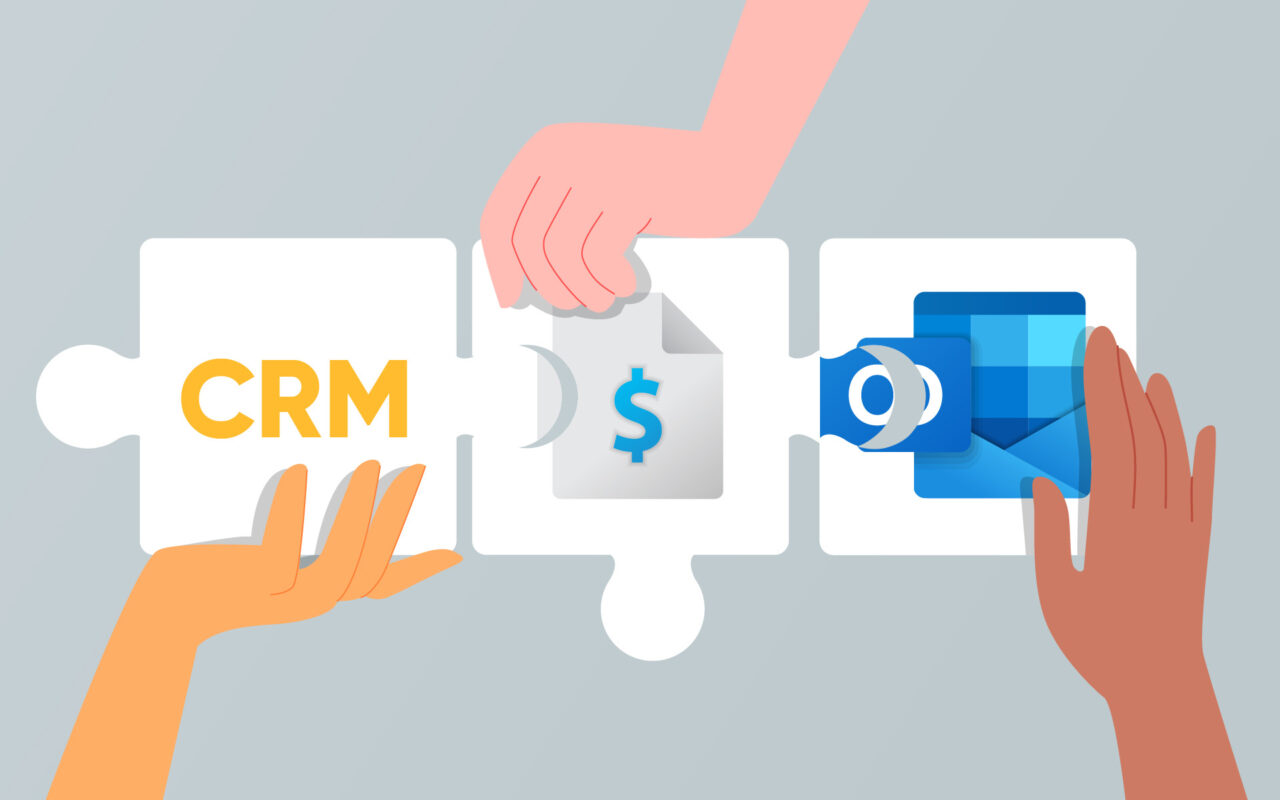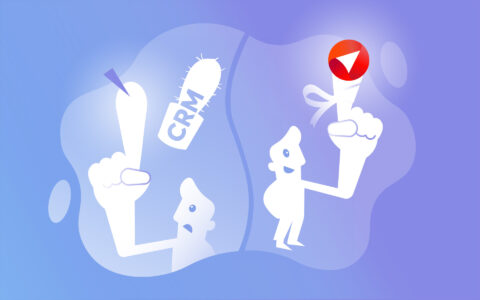Ever felt the frustration of rummaging through a cluttered drawer for a single key? That's the daily reality for businesses juggling customer relations, billing, and invoicing across scattered systems.

But, imagine a world where your essential business tools aren't scattered. Visualize a neatly organized desk where Microsoft Outlook isn't just your email tool, but also your CRM powerhouse. Now, sprinkle in seamless billing and invoicing capabilities.
Well, it's not a figment of imagination but a tangible solution in today's fast-paced business environment. Let's unwrap how to declutter your business processes with CRM billing software making them manageable, and far more profitable.
The Synergy Between Outlook and CRM
The Workhorse for Professionals: Microsoft Outlook has been the silent workhorse for countless professionals, with millions relying on it daily for emails, scheduling, and task management. But there's potential beyond just these functions.
CRM: Beyond a contact management system, a CRM is like an evolved, multi-tiered, interactive customer list. It's not just about names or email addresses, but the entire history of interactions, commitments, and feedback. Imagine this rich tapestry integrated with the familiar environment of Outlook. Suddenly, you've leveled up from a basic phone to a powerful smartphone.
Merging Two Powerhouses: The true dynamism happens when you combine the CRM's capabilities with Outlook's simplicity. It's akin to merging your detailed client diary with your phone, blending contact information with communication history seamlessly. This synergy gives businesses more than just a software tool; they get an all-in-one workspace.
The Benefits of Unified Functionality: With this integration, every email becomes more meaningful, and tied to the client's history. Each calendar reminder is now linked to specific deal details. For the average user, it translates to reduced app-switching and more streamlined work processes. Information flows smoothly, reducing the chances of errors.
A Shift to Smarter Business: In essence, uniting Outlook with CRM isn't merely about tech upgrades. It represents a fundamental shift towards more intuitive and efficient business management.
Billing and Invoicing: The Unsung Heroes of Business
Understanding Their Importance: At the heart of every successful business transaction is the often overlooked process of billing and invoicing. They're more than just paperwork; they're the bridges between services offered and revenue earned.
Why is Billing Crucial? Billing isn't just about asking for payment. It's an organized system that tracks goods sold or services provided, ensuring that businesses are paid fairly and timely. An effective billing system can enhance cash flow, reduce errors, and even foster better client relationships by ensuring transparency.
The Art of Invoicing: While closely related to billing, invoicing serves as an official record of the transaction. It's a tool for communication, indicating to clients not only the cost but also the specifics: what has been provided, in what quantity, and under what terms. A clear, concise invoice can minimize disputes and speed up payment processes.
Challenges in Traditional Billing and Invoicing: Despite their importance, billing and invoicing often face challenges. Manual processes can lead to errors, delayed payments, or even missed revenue. Moreover, when these systems stand alone, separated from client communication tools, it can result in fragmented information and increased administrative work.
The Power of Integration: Integrating billing and invoicing with a system like CRM, especially when embedded in an environment like Outlook, can revolutionize this process. No longer are these tasks siloed. Instead, every piece of communication, every meeting, or task can be directly linked to its financial impact, offering businesses a holistic view of client relationships and financial health.
The Advantages of CRM Billing Software in Outlook
Streamlined Processes: Efficiency at its Best
When billing and invoicing shift into the Outlook environment, powered by a CRM system, processes naturally become more streamlined. Emails, meetings, and tasks align with corresponding invoices, removing the need to juggle between multiple platforms.
Reduced Errors: Say Goodbye to Oversights
Billing mistakes can cost businesses not only in terms of finances but also in client trust. An integrated system ensures that the client data from your CRM aligns perfectly with your billing records, significantly reducing the margin for error.
Holistic View: The Big Picture
Having your CRM and billing software in tandem allows businesses to view client relationships in a broader sense. It's not just about past communications anymore; it's about understanding the entire financial journey with each client.
Enhanced Client Communication
An invoice isn’t just a bill. It’s a touchpoint. Sending it through a platform like Outlook, where your entire communication history resides, ensures that every financial request is tailored and contextual, leading to better client relationships.
Timely Reminders and Follow-Ups
CRMs are fantastic for setting reminders and follow-ups. Imagine never missing an invoicing deadline or forgetting to chase a late payment, simply because your CRM nudges you at the right moment.
Unified Data for Better Decisions
With every piece of data in one place – from client communications to invoicing records – businesses can make better-informed decisions. Be it identifying potential upsell opportunities or spotting payment trends, an integrated system offers invaluable insights.
Why Choose an Integrated System Over Fragmented Solutions?
One Platform, Multiple Solutions
Navigating between different software applications can be not just tedious but also counterproductive. An integrated system provides the comfort of unified navigation, reducing the cognitive load of switching between systems frequently.
Data Consistency: The Backbone of Business Operations
Fragmented systems often lead to discrepancies. One software might record a transaction differently than another, causing confusion. An integrated system ensures data consistency across the board, acting as a single source of truth.
Time-Saving: Focus on What Truly Matters
Every moment spent toggling between systems, cross-referencing data, or manually updating records is time taken away from core business tasks. With an integrated system, administrative tasks are significantly streamlined, allowing businesses to focus on growth and strategy.
Reduced IT Complexity and Costs
Maintaining multiple systems can be a burden on IT resources. Updates, compatibility checks, troubleshooting – each software addition amplifies these challenges. An integrated solution simplifies the IT landscape, leading to potential cost savings and smoother operations.
Enhanced Security: Less Room for Breaches
With fewer systems to safeguard, there are fewer vulnerabilities to exploit. Integrating systems can lead to a more secure environment, as there's a consolidated focus on ensuring the security of a singular platform.
User Adoption and Training
Training employees on multiple software solutions can be daunting. On the other hand, when functionalities like CRM, billing, and invoicing are housed within familiar environments like Outlook, the learning curve is drastically reduced.
Scalability: Growing with Your Business
As businesses expand, their operational needs evolve. Fragmented systems can pose challenges in scaling, whereas integrated solutions, especially those rooted in platforms like Outlook and empowered by tools like eWay-CRM, offer more flexibility and adaptability for future growth.
eWay-CRM: A Premier Choice for CRM Billing and Invoicing in Outlook
Seamless Integration with Outlook
eWay-CRM's key strength lies in its seamless integration with Microsoft Outlook. This provides a unified workspace where all client communications, meetings, and tasks are coupled with billing and invoicing, offering an unparalleled user experience.
Leveraging QuickBooks
One of eWay-CRM’s standout features is its integration with QuickBooks. This means not only do you have a robust CRM in your Outlook, but you also have access to one of the leading accounting software solutions right at your fingertips.
Real-time Data Synchronization
With features like contact synchronization, eWay-CRM ensures that your billing data remains current. Any addition or update in the CRM is reflected in the billing and invoicing sections, making sure the entire system is in harmony.
Empowering Sales with Invoicing Insights
eWay-CRM's integration allows sales reps to view pertinent invoicing data without needing to access separate software. This empowers sales teams to make informed decisions, like identifying unpaid invoices before striking a new deal or tailoring offers based on sales history.
Offline Capabilities: Work Without Limits
Unlike some online-only platforms, eWay-CRM offers robust offline functionality. This means even without an internet connection, you can access invoicing data, make changes, and everything syncs up once you're back online.
Affordability and Scalability
With a flexible pricing model, eWay-CRM ensures that businesses of all sizes can access its features without breaking the bank. Starting with a robust free version, businesses can scale their subscription based on their needs, ensuring they only pay for the features they use.
Beyond Just CRM and Billing
While the focus here is on billing and invoicing, eWay-CRM is more than just that. With project management tools, email marketing functionalities, and a plethora of other features, it's a holistic solution for businesses aiming to centralize their operations within Outlook.
Making the Shift to an Integrated CRM and Invoicing System
Recognizing the Need
Before diving into an integrated system, it's crucial for businesses to understand their specific pain points with current processes. Are you spending too much time reconciling data between systems? Are billing errors a frequent issue? Recognizing the need is the first step.
Evaluating the Right Solution
Not all integrated systems are created equal. It's essential to evaluate based on the specific needs of your business. eWay-CRM's integration with QuickBooks and Outlook might be the perfect match for many businesses, but always ensure it aligns with your business requirements.
Data Migration: A Crucial Step
Transitioning means migrating data from your current systems. While this might sound daunting, many modern CRMs, including eWay-CRM, provide tools and support to ensure a smooth migration process.
Training and Onboarding
Switching systems might come with a learning curve. Ensure there’s a plan in place to train your team, utilizing available resources like tutorials, webinars, or even in-person onboarding if available.
Iterative Implementation
Instead of an all-at-once shift, consider transitioning in stages. Begin with core features like contact management and basic invoicing. Once the team is comfortable, introduce more advanced features, ensuring a smoother adaptation process.
Revolutionizing Business: Merging CRM & Invoicing in Outlook
In today's fast-paced business landscape, efficiency and adaptability are paramount. But is it enough to have the best tools at your disposal? The real magic happens when these tools speak to one another, streamlining processes and enhancing productivity.
Combining CRM with billing and invoicing software in a familiar environment like Outlook is one example of tools that work together to create a dynamic impact. With eWay-CRM's seamless integration with QuickBooks and its myriad of features tailored for businesses, the proposition becomes even more compelling.
As we've explored, the benefits far outweigh the initial effort of transition. From real-time data synchronization to empowered sales processes and beyond, the integrated approach is undeniably the way forward.
So, as we wrap up, let's ponder one final question: In an age where efficiency drives success, isn't it time your business tools started working more harmoniously?
Explore the possibilities of a mobile Outlook-integrated CRM. Learn more in Why Outlook for Android is a Surprisingly Effective CRM Tool











